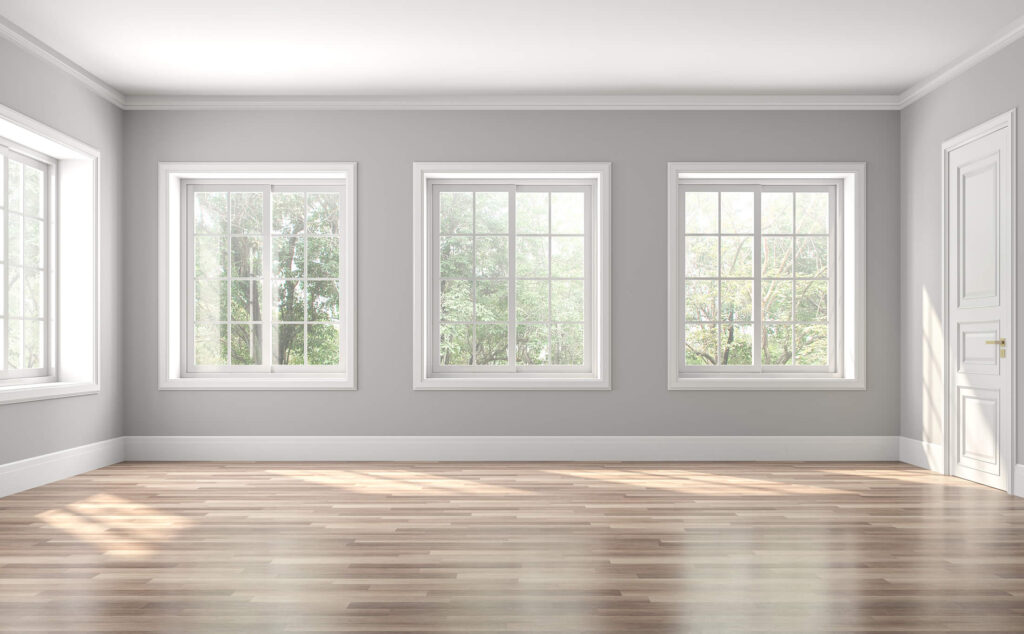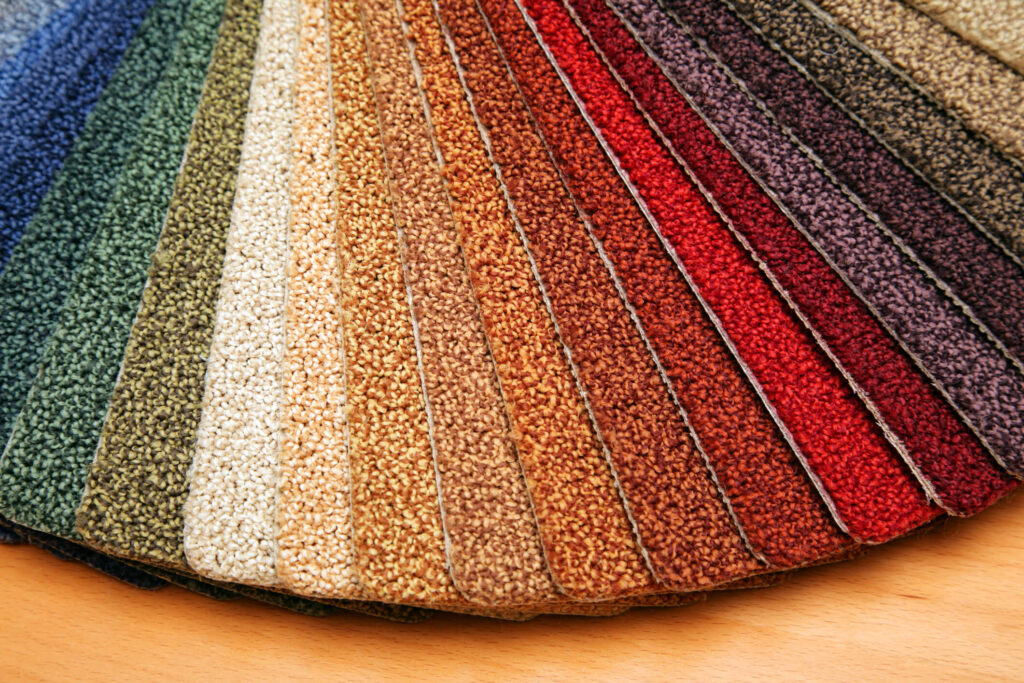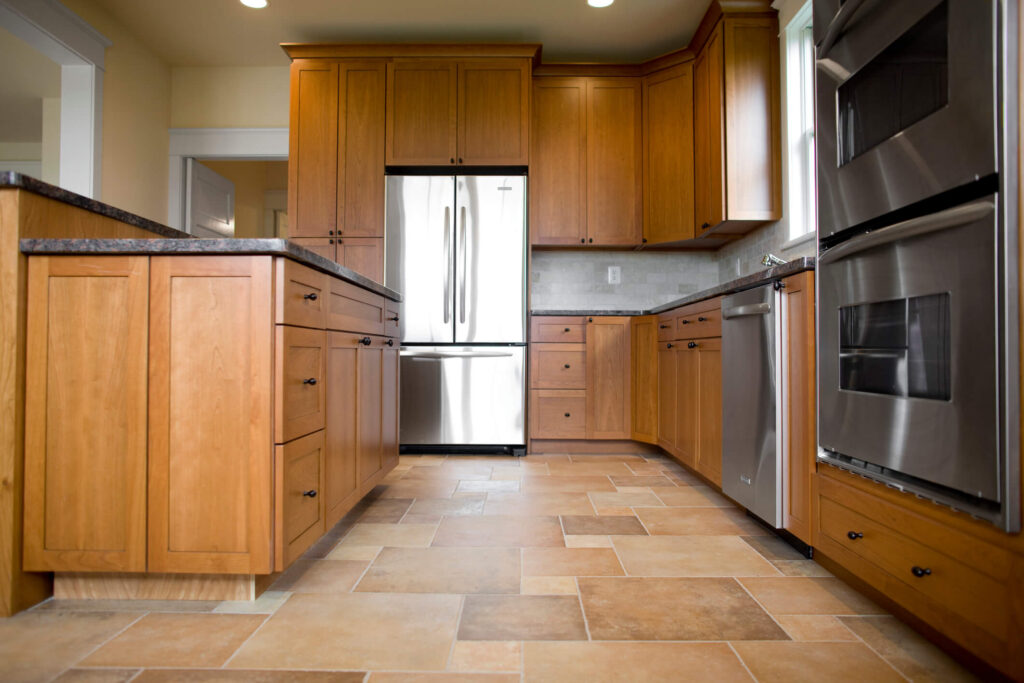There’s a big difference between buying flooring for rental properties and buying flooring for your home. After all, the tenants you place in your rental are going to have their own sense of style. Not to mention, you have to consider factors such as price and durability.

Whether you’re a first-time landlord, have a growing portfolio, or own multi-unit properties, there’s a flooring type out there to fit your needs. Today we’re going to take a look at the different flooring for rental properties that will fit your budget, increase your property’s value, and impress your Phoenix, AZ tenants.
Types of Flooring for Rental Properties
1. Carpet

Carpet is the most popular flooring for rental properties. In fact, in 2019 carpet sales ranked highest in the flooring industry bringing in a whopping 36.4% of all revenue. It’s known for being easy to install and is cost-effective. Plus, people leasing rental properties have come to expect carpet in rooms such as the living room and bedrooms.
Pros of Using Carpet:
- Easy to replace portions of carpet without having to redo the entire floor
- Padding offers exceptional noise barriers, thus avoiding a common tenant complaint
- Endless color and design options, making it versatile
- Soft and full of traction making it perfect for families
- One of the most affordable flooring options for rentals
Cons of Using Carpet:
- Can be difficult to maintain, even with normal wear and tear
- Staining is impossible to avoid and even harder to remove
- Those with allergies will suffer
- Odors are easily embedded in fibers and stick around
- Requires routine deep cleaning and frequent replacement
Carpet is best used in bedrooms and living rooms.
2. Hardwood Floor
Known for being one of the most expensive flooring types for rentals, hardwood floors are great for adding value to a property. They are long-lasting and beautiful, which both landlords and tenants love. There are also lots of design options available for meeting your design and budget needs. For example, you can choose from solid wood planks, strips, or parquet, which is layered wood strips bonded together.
Pros of Using Hardwood Floors:
- Has the potential to increase property value and rent rate
- Quick and easy to clean and maintain
- Natural insulator during all seasons
- Neutral design fits all property styles
- Can be restored and refinished to look brand new
- Tenants love them
Cons of Using Hardwood Floors:
- Expensive to purchase and install
- Limited out-of-the-box design options
- Cannot withstand humidity or standing water
- Dents and scratches are highly visible
- Pets can damage the wood
- Can be noisy
Hardwood floors are best used in living rooms and bedrooms.
3. Laminate
Laminate is a great alternative to hardwood floors. It’s made from recycled hardwood flooring or includes a high-resolution photo of hardwood printed on fiberwood and sealed with a scratch-resistant topcoat. In other words, laminate gives off the appearance of being true hardwood. Lastly, there are tons of design options, it’s more cost-effective than hardwood, and it works well in nearly all rooms.
Pros of Using Laminate:
- Click-locking planks make for easy installation
- Can withstand humidity and moisture
- Replacement of damaged portions is simple
- Very easy to clean and maintain
Cons of Using Laminate:
- Excessive humidity can cause warping or bowing
- Can be slippery when wet
- Hollow sounds echo from it while walking
- Can appear as fake hardwood and hurt your chances of boosting property value
Laminate is one of the most versatile flooring types for rental properties. It can be installed in living rooms, bedrooms, and even kitchens. Though it can withstand humidity and water to a certain extent, there are better flooring options for laundry rooms and bathrooms.
4. Tile

Tile is a modern flooring type for rentals that exudes luxury and functionality. Not to mention, tile comes in plenty of designs, is extremely durable, and can last a long time, even in a rental property. In fact, tile can be manufactured to look like tile, hardwood floors, stone, wood, or any other natural material.
Pros of Using Tile:
- Can withstand humidity (inside or outside)
- Easy to maintain and will not stain easily
- Great for those with asthma or allergies
- Very durable and long-lasting (hard to scratch or chip)
- Will not harbor germs
- Very stylish – from neutral to ultra-
Cons of Using Tile:
- Very hard and can be uncomfortable to walk on
- Can be very cold in the winter months
- Requires frequent re-grouting and resealing
- Damaged tiles can be hard to replace because of out of stock inventory
- Is expensive to purchase and install
- Can be too heavy for those with top-level multi-unit properties
In the end, tile is a great option for kitchens, bathrooms, living areas, and laundry rooms.
5. Vinyl
Vinyl ranks as one of the most affordable options of flooring behind carpet. There are endless design options, from colors to print designs. There is even a type of thick vinyl that looks like tile or hardwood, which is a great option for those on a limited budget.
Pros of Using Vinyl:
- Installation is easy thanks to the adhesive backing
- Easy to cut and fit into unique spaces
- Durable topcoat is resealable and increases durability
- Lightweight nature is perfect for all property types, even upstairs units
- Resists all water – great for humid areas and rooms
Cons of Using Vinyl:
- Is considered outdated to many tenants
- Can be scratched or punctured
- Hard to replace damaged portions, so full replacement is required
- Doesn’t always boost property value or rent rate
- Can be hard to remove
- Sunlight will fade it over time
Vinyl flooring is used primarily in bathrooms, laundry rooms, and kitchens.
6. Concrete
Concrete is an eco-friendly flooring type for rental properties that will not break the bank. It typically requires less energy to produce and is rock solid, which is great for highly trafficked properties. Though it is a heavy flooring, concrete floors can come in a lightweight version for upper-level units.
Pros of Using Concrete:
- Low maintenance and very durable
- Can fit any sized budget
- Stains, colors, and stamps can create stone, tile, brick, and dirt appearances
- Reduces allergens and eases asthma symptoms
- Affordable and eco-friendly option
Cons of Using Concrete:
- Very hard material that can be uncomfortable to walk on
- Requires occasional resealing
- Can be slippery and dangerous when wet
- Over time cracks will appear and require re-pouring
- Standing water or humidity can damage
Concrete flooring is great for kitchens, living rooms, entryways, and garages.
7. Cork
Cork is not only environmentally friendly, there are endless design options. This flooring type is created from the outermost bark of cork oak trees. The process doesn’t harm the tree and makes it one of the best alternatives to hardwood flooring.
Pros of Using Cork:
- Very soft, much like carpet
- Long-lasting and durable
- Hypoallergenic and antimicrobial
- Easy to install and maintain
- Absorbs noise while walking
- Versatile in design, textures, and finishes
- Resistant to rot because of humidity
Cons of Using Cork:
- Sunlight will fade with excessive exposure
- Requires water sealing to prevent swelling and damage
- Dents and divots are commonplace
- Pooled water can damage
Cork is perfect for those that want to reduce their carbon footprint and give tenants a unique flooring to enjoy.
8. Engineered Hardwood
The last flooring type for rental properties worth mentioning is engineered wood. Unlike solid and true hardwood flooring, engineered hardwood is fiberboard with a real wood veneer layer on top. This gives the floor the appearance of hardwood without all the added cost.
Pros of Using Engineered Hardwood:
- Absorbs noise, unlike hardwood
- Very durable and easy to clean
- Will not warp or bow due to moisture
- Better looking wood than laminate, more cost-effective than hardwood
- More eco-friendly than solid hardwood
Cons of Using Engineered Wood:
- UV discoloration a possibility
- Scratches, dents, and divots are common
- Cannot be refinished or re-sealed like solid hardwood
- Improper cleaning and excessive water exposure can ruin the finish
- More expensive than laminate flooring
Engineered hardwood flooring is great in the same rooms as solid hardwood - plus some. For example, it's great in living areas, bedrooms, kitchens, and possibly bathrooms.
Final Thoughts
Are you in need of Phoenix Property Management? Then contact us today and see how we can help you boost the value of your property, increase tenant satisfaction, and make owning a rental property a hassle-free experience.
At Real Property Management Phoenix Valley, we understand the importance of the flooring types in rental properties. Floors are something your tenants have to live with every day. From styles to maintenance, repairs to improvements, we have the knowledge and experience needed to give your property the facelift it needs. Not to mention, we can help you with all your other property management needs such as tenant screening, rent collection, property inspections, and so much more.

